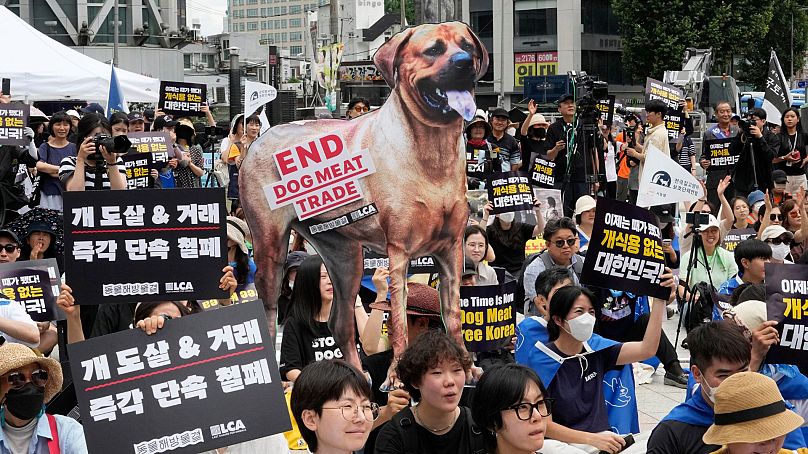Some dog farmers plan to challenge the upcoming ban on production and sales of dog meat.
South Korea’s parliament has passed a landmark ban on the production and sale of dog meat.
 ADVERTISEMENT
ADVERTISEMENT
 ADVERTISEMENT
ADVERTISEMENT
Although only a small minority of people still consume dog meat in South Korea, the ancient practise has been the subject of sharp criticism from foreign media and animal rights advocates. In recent years, the country’s younger generations have joined calls to ban it.
On Tuesday 9 January, parliament heeded their calls. The new bill will make slaughtering, breeding and sales of dog meat for human consumption illegal from 2027 and punishable by two-to-three years in prison. It doesn’t provide any penalties for eating dog meat.
How common is dog meat in South Korea?
Dog meat consumption is neither explicitly banned nor legalised in South Korea.
Recent surveys show more than half of South Koreans want dog meat banned and a majority no longer eat it. But one in every three South Koreans still opposes a ban even though they don’t consume it.
There is no reliable official data on the exact size of South Korea’s dog meat industry. Activists and farmers say hundreds of thousands of dogs are slaughtered for meat each year.
In 2022, South Korea’s national broadcaster KBS reported that more than half a million dogs were being raised for food across the country and 1,600 restaurants were selling dog meat.
As of February 2022, there were 1,156 farms breeding dogs for meat and 34 slaughterhouses, according to the Ministry of Agriculture, Food and Rural Affairs.
A grace period of three years will be given to allow the industry to transition and close down, with crackdowns starting in 2027.
South Korea’s dog meat ban passed unanimously
The National Assembly passed the bill by a 208-0 vote. It will become law after being endorsed by the Cabinet Council and signed by President Yoon Suk Yeol, considered formalities since his government supports the ban.
“This law is aimed at contributing to realising the values of animal rights, which pursue respect for life and a harmonious co-existence between humans and animals,” the legislation says.
The bill offers assistance to dog farmers and others in the industry in shutting down their businesses and shifting to alternatives. Details are to be worked out among government officials, farmers, experts and animal rights activists.
Humane Society International called the legislation’s passage “history in the making”.
“I never thought I would see in my lifetime a ban on the cruel dog meat industry in South Korea, but this historic win for animals is testament to the passion and determination of our animal protection movement,” said JungAh Chae, executive director of HSI’s Korea office.
Is there public support for the ban?
A 2023 survey by animal rights group Korea Humane Society International (Korea HSI) and research agency NielsenIQ showed public support for a dog meat ban, with 57 per cent of the 1,500 respondents in favour.
More than 86 per cent of the adults surveyed said they have no intention of eating dogs in the future, regardless of whether they had in the past.
It also found an increased negative perception of dog meat among those in their 40s and 50s, and increased consensus on the need to protect the welfare of the animals.
Farmers were extremely upset by the bill's passage, however.
“This is a clear case of state violence as they are infringing on our freedom to choose our occupation. We can’t just sit by idly,” said Son Won Hak, a farmer and former leader of a farmers’ association.
Son said dog farmers will file a petition with the Constitutional Court of Korea and hold demonstrations. He said farmers will meet on Wednesday to discuss other steps.
The anti-dog meat campaign received a huge boost from the country’s first lady, Kim Keon Hee, who has repeatedly expressed her support for a prohibition. She has become the subject of withering criticism and crude insults during demonstrations by farmers.
The legislation doesn't clearly specify how dog farmers and others in the industry will be supported after the ban, which will likely result in continued animosities, observers say.
“Dogs are different from cows, chickens and pigs," said Kim Myung-ae, a 58-year-old Seoul resident. "Why would you still eat dogs when they are now seen more as family-like pets than food?”
Another Seoul resident, Jeong Yoon Hee, disagreed, saying whether to eat dog meat is a matter of a personal choice and dietary culture. “Dogs are dogs, not humans,” he said.











